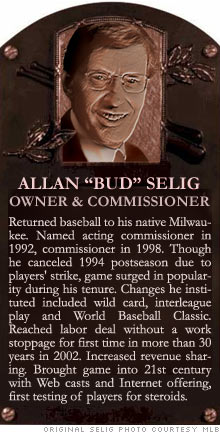Hall of Fame voters: This Bud's for you There's a lot to dislike about the tenure of baseball's much maligned commissioner, but Bud Selig's impact on the game makes him worthy of the Hall. NEW YORK (CNNMoney.com) -- If he's ever inducted into baseball's Hall of Fame, Bud Selig would be one of my least favorite honorees. But he certainly would be a worthy one. Like many baseball fans, I consider Sept. 14, 1994, the day he canceled that year's playoffs, to be one of the darkest days in the game's history. And I blame Selig even more than the players' union for that disaster. I'm not alone in that view.
Selig also deserves much of the blame for being a ringleader in the collusion that took place in the late 1980s when owners agreed to not sign the best available players, a move that could be compared to throwing a World Series in return for a payoff. Selig was the owner of the Milwaukee Brewers at the time. So it can be argued that if the 1919 Black Sox scandal kept Shoeless Joe Jackson out of the hall, collusion should keep Selig out. "There's no question Selig and (White Sox owner Jerry) Reinsdorf led collusion," said Fay Vincent, who was forced out as commissioner in 1992 by a group led by Selig and Reinsdorf. "They got caught, and I think that was immoral and wrong and it violated the collective bargaining." But as the Hall is set to honor its biggest class of inductees this weekend, Vincent told me he won't issue an opinion on whether Selig should be honored in Cooperstown. Even he acknowledges, "He's made a lot of positive contributions, such as revenue sharing. There are a lot of assets on his balance sheet." Support of critics Other long-time Selig critics told me this week they clearly think Selig should eventually get in the hall. "The Hall of Fame is about character, but it's about impact on the game," said Gary Gillette, editor of the "Baseball Encyclopedia." "He's had enormous impact on the game. He's done a tremendous job maximizing revenue for the owners." Smith College economics professor Andrew Zimbalist, whose most recent book is "In the Best Interest of Baseball? The Revolutionary Reign of Bud Selig" said that although Selig's mistakes hurt the game, he's been a very important innovator. He cited the success of MLB.com, the launch of the World Baseball Classic and the creation of a marketing department that baseball never had before Selig. "There's been such a fundamental sea-change under Selig for the betterment of the game," said Zimbalist, adding that under Selig baseball finally started "to treat itself like a real business." While Zimbalist believes the players union still has a distrust of ownership due to the collusion, the economics of the game have improved enough under Selig that he doesn't think fans have to worry about more work stoppages. "We used to have strikes and lockouts when the owners weren't making money and the players were making $750,000 a year," said Zimbalist. "Today most teams are making money and the players are making $2 million on average." Zimbalist said that perhaps Selig's greatest achievement is building consensus among owners for all the moves he's made. That has allowed him to move to build a partnership with the players in a way that owners would never allow earlier commissioners to do. Owners today never worry about Selig undercutting them in the next round of negotiations. Selig's consensus-building was a key to winning the revenue sharing agreement that is helping to level the playing field between large and small market clubs. And the wild card, which has allowed more teams to remain in the playoff chase, has kept more fans interested in the game over the course of a long season. While there is still debate over the merits of interleague play and the World Baseball Classic, those have also proved to be popular with fans. One of Selig's greatest legacies might end up being MLB Advance Media, the joint Internet operations for all the clubs. Besides being a leader in things like Web casts and mobile updates for fans, Selig was able to get the owners to agree in 2000 to equally share their Internet revenue, a move that might one day be comparable to Pete Rozelle getting the NFL owners to agree to share their national television revenue. Of course even with his achievements, it could be tougher for Selig to get in the Hall than it will be for Pete Rose. As an executive, he will be considered by all living members of the Hall, primarily former players, along with writers and broadcasters who have been honored in their own wings. That group has yet to give any candidate -- player, umpire or executive -- the 75 percent support necessary for induction since it was constituted in 2003. Even Marvin Miller, the former executive director of the Players Association who helped put millions of dollars into the pockets of many current Hall members, only got 44 percent of the vote in the most recent election. "If Marvin Miler can't get elected, no one can get elected," said Vincent. "If they don't change the rule, nobody other than a player will ever get in the Hall again." Selig might have trouble even if there is a change in voting procedures. Someone who makes significant changes has a tendency to be a polarizing figure. But I think Selig has done more to improve the success and popularity of his game than has National Football League Commissioner Paul Tagliabue, who inherited a much more successful league than did Selig. And as Tagliabue prepares to retire, all that is heard is near universal acclaim, while Selig still faces scorn. If those critics are honest, they should give Bud his due as perhaps the game's greatest commissioner. |
| |||||||||||



